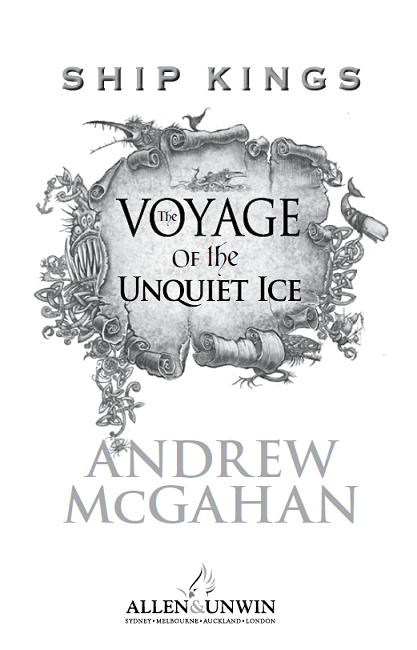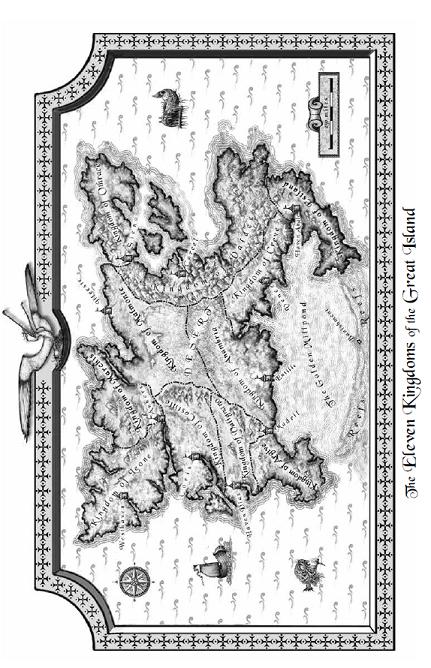The Voyage of the Unquiet Ice


P
RAISE FOR
S
HIP
K
INGS
âAn exhilarating read. McGahan lets his adventure build gently and a detailed, evocative coming-of-age story unfolds.'
The
Saturday Age
âThis beautifully crafted novel shapes up as a classic seafaring tale. In Dow, we have the makings of a classic hero.'
The
Herald Sun
âMcGahan captures the mystery and romance of the sea, and draws us in with his fine portrayal of his restless lead.'
Australian Bookseller + Publisher
âMcGahan's narrative is gripping and melancholy ... the prose evocative⦠utterly compelling.'
Australian Book Review
âMcGahan has produced a memorable start to his trilogy, peopled with characters who stay in the mind ...
One can only hope that it will not be long before the next episode of Dow's life takes place.'
Magpies
âMasterful storytelling, elegant prose and a powerful sense of place ... the kind of storytelling that stays with you long after the tale has ended.'
Viewpoint
SHIP KINGS
THE COMING OF THE WHIRLPOOL
THE VOYAGE OF THE UNQUIET ICE
To Follow:
THE WAR OF THE FOUR ISLES
THE OCEAN OF THE DEAD


This project has been assisted by the Australian Government through the Australia Council, its arts funding and advisory body.
First published in 2012
Copyright © Andrew McGahan 2012
All rights reserved. No part of this book may be reproduced or transmitted in any form or by any means, electronic or mechanical, including photocopying, recording or by any information storage and retrieval system, without prior permission in writing from the publisher. The Australian
Copyright Act
1968 (the Act) allows a maximum of one chapter or ten per cent of this book, whichever is the greater, to be photocopied by any educational institution for its educational purposes provided that the educational institution (or body that administers it) has given a remuneration notice to Copyright Agency Limited (CAL) under the Act.
Allen & Unwin
83 Alexander Street
Crows Nest NSW 2065
Australia
| Phone: | Â Â (61 2) 8425 0100 |
| Fax: | Â Â (61 2) 9906 2218 |
| Email: | Â Â [email protected] |
| Web: | Â Â www.allenandunwin.com |
A Cataloguing-in-Publication entry is available from the National Library of
Australia
www.trove.nla.gov.au
ISBN 9 781 74237 822 0
Cover and text design by Liz Seymour
Cover, map and internal illustrations by Ritva Voutila
Printed and bound in Australia by Griffin Press
10 9 8 7 6 5 4 3 2 1


Contents
A VERY SHORT HISTORY OF THE WORLD
7. IN THE LATITUDE OF STORMS AND MISTS
A VERY SHORT HISTORY OF THE WORLD
I
n the beginning â at least as Ship Kings scholars would tell the tale â there was only one inhabited land in all the world, and that was Great Island.
It was there, in the days before history began, that the first people arose; the ancestors of the Ship Kings, although they were not then called by that name. Indeed, they were not even sailors â they were an inland folk, roaming the ancient forests of Great Island's interior. But in time those forests turned to deserts, and the people were forced to the coasts, where they first beheld the Great Ocean. And they stared in wonder, for they had not known that their vast land was ringed all about by even vaster waters.
A hunger woke in them to explore the sea, and so they built their first flimsy boats, and established their first harbours from which to launch them. These ports became cities, and the cities came to rule over great territories, and thus became kingdoms â the famed eleven kingdoms of antiquity. Yet even as the kingdoms were founded, they were at war with one another, for although the folk of Great Island were one by blood and language, they were proud and fierce too, quick to take offence, and eager for conflict.
But their deepest passion remained the sea, and even amid all their warring and dissension, their shipbuilding skills increased, their vessels grew larger, and their mariners roamed ever further from their home shores, delighting in the joys of the open ocean and of unfamiliar stars.
They wondered, too, if there were other lands to be found, but for many years such discovery eluded them; the world seemed empty of anything but water. But finally another land was indeed happened upon, some two months sail to the west; a grey isle set in cold seas. It was only half as large as Great Island, and mountainous and snow-covered in part, but it was fertile even so, and quite uninhabited. A fresh land. A
new
land.
And so they called it New Island.
Inspired by this success seafarers dared to sail further yet, and at length they located two more lands, Whale Island and Red Island, each small in size, but rich in its own special way. These Twin Isles â as they were also known, being set close together â lay amid the warm seas of the south, and were a further two months sail southwest from New Island. In fact, for mariners from the eleven kingdoms, the Twin Isles were fully halfway around the world. And it was in this time â the great Age of Exploration â that ships first circled the world entire and came back to where they had begun.
The circumnavigators discovered no additional lands, however. Instead they found only increasing dangers â monsters of the deep, and terrible storms, and treacherous reefs. And their paths were hemmed on either hand. Those who ventured north met waters choked with mountains of grinding ice, and those who went south were thwarted by the Barrier Doldrums, ringing the waist of the globe and hiding forever its southern half.
Ships were lost, and men died, and captains grew wary. The habitable world, it seemed, consisted of the Four Isles alone, and elsewhere lay naught but perilous wastes into which it was foolish to stray. The Ship Kings declared that all discovery was therefore done and that they were masters now of all the sea. But in truth the greater part of the ocean remained dark to them, and ships sailed only the narrow, safe waters between the Four Isles.
Nevertheless, those waters were busy, for settlement of the new lands carried on apace, with each of the eleven kingdoms establishing colonies on the new islands. The colonies prospered, and wealth flowed back to the homelands. But from that wealth new jealousies arose, and finally the eleven kingdoms fell into a cycle of wars more bitter and long-lasting than ever before â and in doing so lost control of their settlements.
For the settlers turned their backs upon the old rivalries of the kingdoms, and declared independence. They became, in turn, New Islanders and Whale Islanders and Red Islanders. And as the Ship Kings (as they now began to be called) warred on through the centuries, the three newer Isles developed their own ways and beliefs, so different to those of their forefathers that it became hard to believe they had even been akin.
But the new Isles had one great weakness; they were not martial peoples. Although they built their own fleets, and were skilled mariners in their fashion, they sailed mainly for fishing or trade, not for warfare â and warfare was an art that the Ship Kings had honed above all others. Thus when the eleven kingdoms of Great Island made peace between themselves at last, and united under the first Sea Lord, they knew themselves to be stronger than their colonies of old. And so the Great War was declared, and won, and lost.
But even after the war, when Great Island once again ruled over all, the Ship Kings were still slow to resume their voyages of exploration. For they had changed by then as a people, and where once they had sailed for sailing's own sake, they now sailed only as warriors and overlords, amassing the spoils of their empire. No new era of discovery dawned, and the distant wilds of the ocean remained unvisited, save by rare wanderers who seldom returned, and whose tales were scarcely believed if they did.

